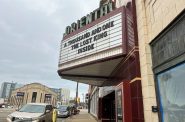“The Arbor” at UWM Union Cinema
It has become fairly common for films to mash realism with fictitious narrative. Most often used in horror ( think The Blair Witch Project or Paranormal Activity), the device has been more recently used for dramatic purposes (I’m Still Here, Catfish). Dramatically, the style can be problematic because the con can come off as flippant and shallow, rather than an honest attempt at authenticity. These movies start with a fictional base that is then communicated “realistically.”
The Arbor reverses this structure, using reality as its foundation and telling its story with techniques more common in works of fiction. It plays with both genres ambitiously, creating a film with multiple layers of performance and emotional drama.
The film tells the story of the tumultuous life of British playwright Andrea Dunbar, who penned three plays during her late teens and twenties and died suddenly at 29. Much of the film focuses on Dunbar’s eldest daughter, Lorraine, who was doomed to repeat her mother’s life of addiction and abuse.
Titled after Dunbar’s first play, The Arbor takes place in the Buttershaw estates, a notoriously tough working-class neighborhood devastated by the death of the manufacturing economy that initially supported it. Like many neighborhoods of its type, it was likewise plagued by racism among its white and predominantly Pakistani inhabitants, who had immigrated to the region to work in its factories before their decline. Lorraine, having a Pakistani father, is also ostracized by her mother and denied a cultural identity other than “white.” Lorraine suffers the hardest as her mother’s child, but she is the most introspective and articulate of Dunbar’s family and lovers.
Stylistically, and most simplistically, the film blends past footage from interviews of Andrea Dunbar in the 1980s. On a deeper level, it stages portions of Dunbar’s play, The Arbor, in the current-day Buttershaw estates. Current residents of the neighborhood look on from the background as scenes are performed by actors, with stage and setting directions presented to the viewer via the fourth wall.
Deeper still, the actors who are part of the documentary narrative of Andrea Dunbar’s life exist as stand-ins for the real people. These actors relate the various personal stories of the real characters, but their voices are dubbed with the actual voices of the people they are meant to represent. The actors in the film flawlessly lip-synch every pause, shudder, and rhythm of the original recorded interviews.
Impressively, The Arbor achieves narrative cohesion and an emotional impact that is twofold. First, it is successful at expressing the raw emotion of characters whose lives are steeped in addiction, abuse, and confrontation at any level. Second, its style lets the actors deliver their stories with a frankness that might otherwise be hard to create. At the end of the film, what is left is numbness and plain-faced acceptance of great pain and tragedy, filtered through the murk of where real life and fiction meet.
The Arbor plays at the UWM Union Theatre, 2200 E. Kenwood Blvd., on Thursday, May 12, at 7 p.m. The screening is free and open to the public. For more information, click here.
Movies
-
Milwaukee Film Festival Returns in April
 Mar 27th, 2024 by Sophie Bolich
Mar 27th, 2024 by Sophie Bolich
-
Nina Simone’s Summer of Soul
 Nov 29th, 2022 by John Sieger
Nov 29th, 2022 by John Sieger
-
The Surprise Pick for Best Picture
 Mar 22nd, 2022 by Dominique Paul Noth
Mar 22nd, 2022 by Dominique Paul Noth






















